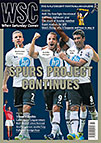 Mike Whalley takes a look at Hyde’s terrible winless run
Mike Whalley takes a look at Hyde’s terrible winless run
Scott McNiven is, by his own admission, hard to live with when he isn’t winning. The manager of Hyde, the Conference Premier’s bottom club by a mile, can barely remember what victory feels like. Twenty-six league games have brought no wins and just three points. The New Year opened with an unwanted record beckoning: no team in Conference history, going back to 1979, has gone through a whole season without a league win. McNiven’s wife Adele is enduring a lot of gloomy weekends. “She’s very understanding, especially as I don’t really speak to her on Saturday evenings now,” he says. “I’m not in the best mood for conversation after a defeat.”
Not that perspective is much help to a side with such appalling form. McNiven, a 35-year-old former Oldham and Oxford defender, can point out that Hyde are one of the Conference Premier’s few part-time teams, that he has to juggle his role with a nine-to-five job as an account manager for an insurance company, doing what football business he can in his lunch hour or after work, and that his side have been incredibly unlucky at times. But most outsiders know only of the zero in the wins column and the tie-up with Manchester City.
The misconception that City are bankrolling their neighbours persists, when the truth is that the link-up between the clubs was always more about keeping Hyde in business following a brush with extinction. In September 2009 Hyde United – as they were then known – were wound up in the High Court over an unpaid £120,000 tax bill. City allowed a bucket collection at their next home game, which brought in around a quarter of the £35,000 that Hyde raised in a week to mount a successful appeal against liquidation.
Nine months later, City signed a three-year agreement to play reserve games at Hyde’s Ewen Fields home. Neither party revealed the value of the deal, which was renegotiated for a further 12 months last summer, although most of the money the non-League club received went on clearing debts and renovating the ground rather than funding a squad. What rankled with some Hyde fans was the decision to drop “United” from the club name and – for one season – to dump their red home strip in favour of a white kit. In the meantime, Ewen Fields was refurbished in City’s sky and navy blue colours. Such was the price of salvation.
Further complications lay ahead. In early 2011, as it emerged that Hyde were still struggling to pay players, their club secretary Tony Beard resigned. Police have since charged him with three counts of fraud – including a claim that he took more than £11,000 out of the club – and one of false accounting. Beard, who denies all the charges, is scheduled to stand trial in March.
That Hyde are on a steadier footing now is thanks not so much to City but to majority shareholder John Manship, who was already helping to pay the club’s wages and tax demands before he officially joined the board in March 2011. Leicestershire-based Manship, one of the UK’s leading dealers in vintage soul records, has the wealth to keep Hyde clear of any more financial craters but wants the club to live within their means. With average crowds of around 650, that has meant staying part-time since winning promotion to the Conference Premier in 2012. Against the odds, Hyde finished five points clear of relegation under McNiven last May. Several key players then left – most notably striker Scott Hogan for League Two Rochdale – and were not adequately replaced.
Hyde started this season by losing 8-0 at Forest Green, yet theirs has not been a story of regular hammerings. Of their 26 league games up to January 4, they led in nine. Against Nuneaton on November 2, they went 2-1 up in the 92nd minute – then conceded an equaliser in the 93rd. It has been that sort of season.
National notoriety has followed; Jeff Stelling namechecks Hyde on Sky’s Soccer Saturday, McNiven was interviewed by the Times over Christmas and orders for club scarves are coming in from all over the country. But who wants to be famous for losing? “It’s a massive confidence issue with the players,” the manager says. “But you can’t give players confidence; that only comes with a win.” That cannot come soon enough.
From WSC 324 February 2014